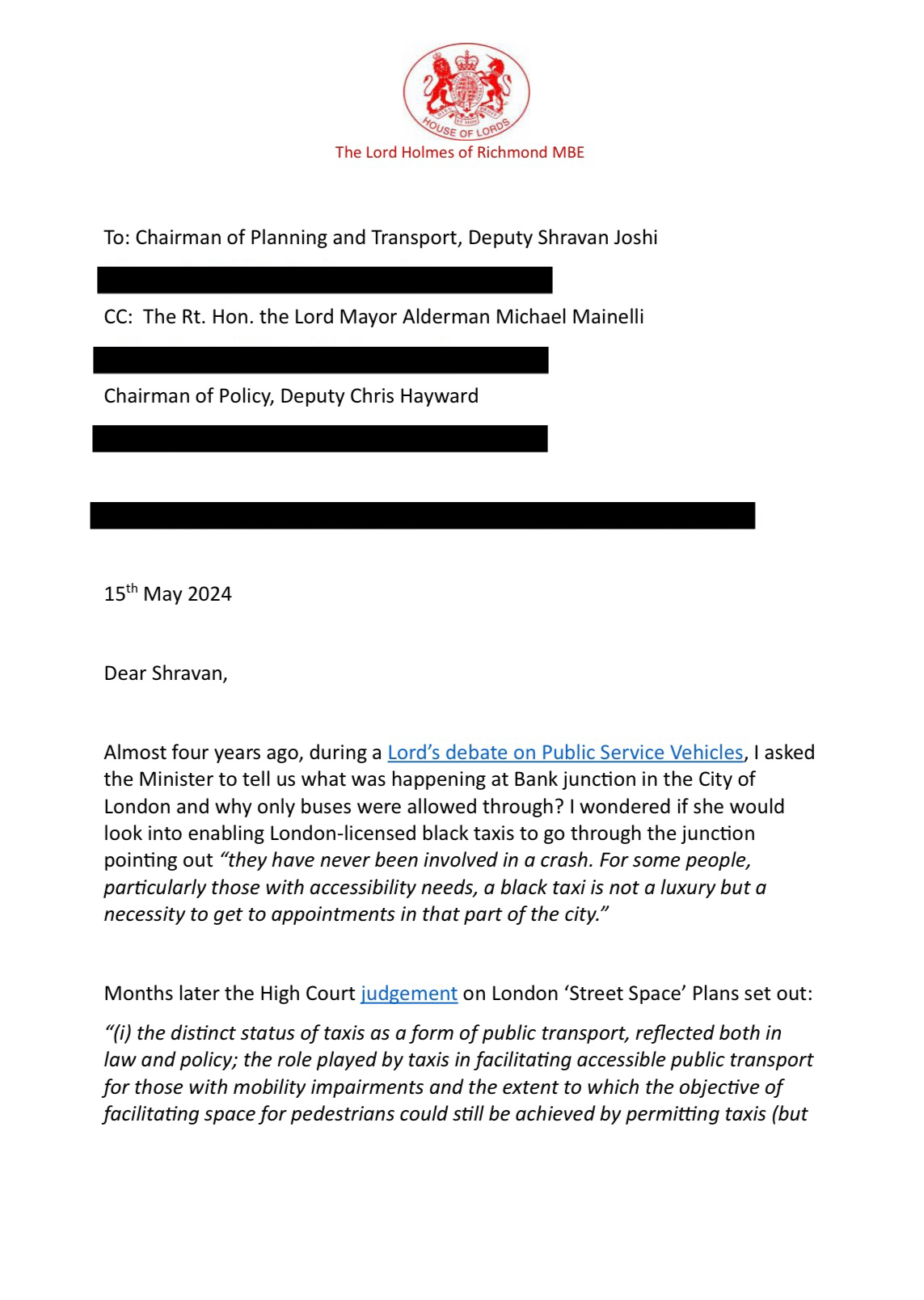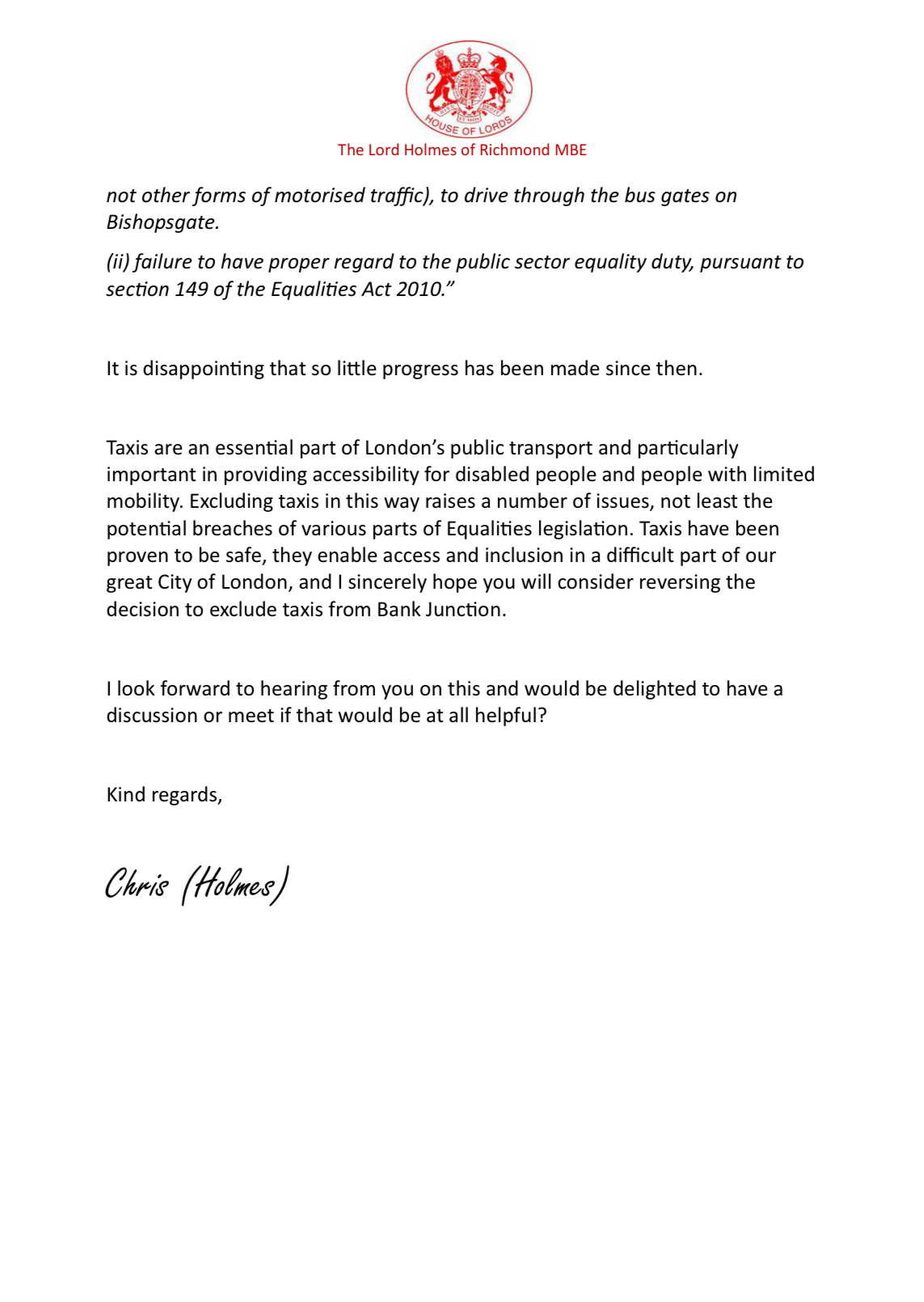OPEN IT UP: Lord Holmes pens open letter to City of London Committee ahead of Bank Junction taxi debate

Today marks the beginning of a critical period for black cabs as they push to regain access through Bank Junction.
Since 2017, restrictions have limited access to this key financial district crossing to only buses and cyclists from 7am to 7pm on weekdays, leaving black cabs barred and significantly disrupting their operations.
The City of London’s governing committees are set to address this contentious issue in upcoming discussions. Today the Planning & Transport Committee will convene, with their deliberations likely influencing a crucial decision by the Court of Common Council scheduled for 20 June.
Lord Holmes of Richmond MBE has penned and submitted an open letter to the City of London Chair of Planning and Transport, Deputy Shavran Joshi, ahead of the meeting. He highlighted the importance of black taxis, particularly for those with accessibility needs, stating that these vehicles are not a luxury but a necessity for many to reach appointments in the City.
Lord Holmes continued to emphasise that taxis are vital for accessibility in London and that excluding them could breach equality legislation. He called for a reconsideration of the decision to bar taxis from Bank Junction and also offered to meet and discuss the issue more.
The outcome of these discussions could significantly impact the future of black cabs in the City of London.
As the key discussions approached, there was a growing optimism among stakeholders, including drivers, local businesses, and commuters, that black cabs could once again service one of London’s busiest junctions. However, in the last week, the industry and advocates for the return of accessible black cabs through Bank Junction were dealt a blow.
A review by the Court of Common Council, initiated in April 2022, has been completed and made public. The report is designed to equip the Planning & Transportation Committee with information aimed to help them make an informed decision regarding taxi regulations in the City.
Key findings of the report included:
The effect of existing restrictions on taxi journey times and costs is negligible for most routes.
The availability of taxis and private hire vehicles is stable across the City, aided by ride-hailing technology.
However, concerns have been raised for vulnerable groups, including disabled people, older individuals with mobility issues, and pregnant women, who depend on taxis for mobility.
Despite calls from taxi drivers and passengers to modify the restrictions at Bank, the study found no substantial transport-related reasons to alter the current rules that prohibit taxis during peak hours. Nevertheless, the report did recognise potential economic and reputational risks for the City, indicating that perceptions of accessibility and a welcoming environment for business and tourism might be affected by these restrictions.
The committee will now be presented with two options:
1. Continue the current policy, allowing only buses and cycles at the junction during specified hours.
2. Permit taxis at all times under an experimental traffic order, while maintaining other restrictions.
Disappointingly for supporters and groups pushing for fully accessible black cabs in the area, the review leans towards preserving the existing arrangement (Option 1), mainly because of the notable decrease in traffic incidents and the absence of convincing evidence that allowing taxis would enhance the overall transport system or significantly address the identified equality concerns.
However, not included in the report was data provided by global taxi app firms and surveys conducted by taxi driver associations.
Data revealed that from taxi requests made via FREENOW from 1 July 2023 until 23 October 2023, a shocking 75% were unable to be completed in the Bank Junction. Many taxi drivers in the area face challenges reaching the pick-up location within a reasonable time frame or simply refuse to operate within the district due to the existing restrictions.
A survey conducted by the Licensed Taxi Drivers' Association (LTDA) last year revealed that 65% of the capital's taxi drivers avoid some or all of the City of London due to the existing restrictions at places like Bank Junction and Bishopsgate.
The access problems also affected corporate taxi requests made by businesses in the area, with 48% of them unable to be fulfilled during the same time period.
As a result of the limited access to Bank Junction, only one in four people in the area who requested a taxi were able to secure a black cab.












